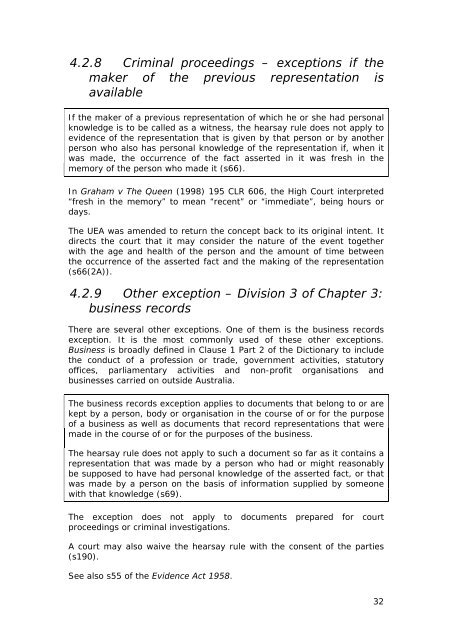Introduction to the UEA - Victorian Law Reform Commission
Introduction to the UEA - Victorian Law Reform Commission
Introduction to the UEA - Victorian Law Reform Commission
You also want an ePaper? Increase the reach of your titles
YUMPU automatically turns print PDFs into web optimized ePapers that Google loves.
4.2.8 Criminal proceedings – exceptions if <strong>the</strong><br />
maker of <strong>the</strong> previous representation is<br />
available<br />
If <strong>the</strong> maker of a previous representation of which he or she had personal<br />
knowledge is <strong>to</strong> be called as a witness, <strong>the</strong> hearsay rule does not apply <strong>to</strong><br />
evidence of <strong>the</strong> representation that is given by that person or by ano<strong>the</strong>r<br />
person who also has personal knowledge of <strong>the</strong> representation if, when it<br />
was made, <strong>the</strong> occurrence of <strong>the</strong> fact asserted in it was fresh in <strong>the</strong><br />
memory of <strong>the</strong> person who made it (s66).<br />
In Graham v The Queen (1998) 195 CLR 606, <strong>the</strong> High Court interpreted<br />
“fresh in <strong>the</strong> memory” <strong>to</strong> mean “recent” or “immediate”, being hours or<br />
days.<br />
The <strong>UEA</strong> was amended <strong>to</strong> return <strong>the</strong> concept back <strong>to</strong> its original intent. It<br />
directs <strong>the</strong> court that it may consider <strong>the</strong> nature of <strong>the</strong> event <strong>to</strong>ge<strong>the</strong>r<br />
with <strong>the</strong> age and health of <strong>the</strong> person and <strong>the</strong> amount of time between<br />
<strong>the</strong> occurrence of <strong>the</strong> asserted fact and <strong>the</strong> making of <strong>the</strong> representation<br />
(s66(2A)).<br />
4.2.9 O<strong>the</strong>r exception – Division 3 of Chapter 3:<br />
business records<br />
There are several o<strong>the</strong>r exceptions. One of <strong>the</strong>m is <strong>the</strong> business records<br />
exception. It is <strong>the</strong> most commonly used of <strong>the</strong>se o<strong>the</strong>r exceptions.<br />
Business is broadly defined in Clause 1 Part 2 of <strong>the</strong> Dictionary <strong>to</strong> include<br />
<strong>the</strong> conduct of a profession or trade, government activities, statu<strong>to</strong>ry<br />
offices, parliamentary activities and non-profit organisations and<br />
businesses carried on outside Australia.<br />
The business records exception applies <strong>to</strong> documents that belong <strong>to</strong> or are<br />
kept by a person, body or organisation in <strong>the</strong> course of or for <strong>the</strong> purpose<br />
of a business as well as documents that record representations that were<br />
made in <strong>the</strong> course of or for <strong>the</strong> purposes of <strong>the</strong> business.<br />
The hearsay rule does not apply <strong>to</strong> such a document so far as it contains a<br />
representation that was made by a person who had or might reasonably<br />
be supposed <strong>to</strong> have had personal knowledge of <strong>the</strong> asserted fact, or that<br />
was made by a person on <strong>the</strong> basis of information supplied by someone<br />
with that knowledge (s69).<br />
The exception does not apply <strong>to</strong> documents prepared for court<br />
proceedings or criminal investigations.<br />
A court may also waive <strong>the</strong> hearsay rule with <strong>the</strong> consent of <strong>the</strong> parties<br />
(s190).<br />
See also s55 of <strong>the</strong> Evidence Act 1958.<br />
32

















